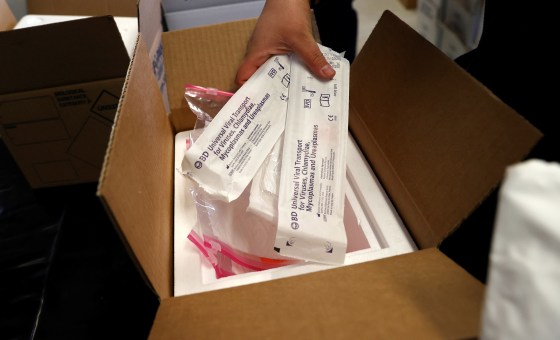Homeowners rest assured: Thieves are not posing as health officials testing for the coronavirus.
A particularly viral hoax has spread across local news outlets, police departments and social networks cautioning people in various parts of the world to beware of scammers posing as "coronavirus testers," sometimes in hazmat suits, determined to break into homes.
Despite reports from news agencies and police departments from the U.S. to South Africa and the U.K., there does not appear to be any evidence of the viral urban legend's occurring in real life. But articles and posts around the world warning of the phenomenon have garnered millions of shares on Facebook.
NBC News contacted several police departments that issued warnings about door-to-door scammers. None said they had substantiated reports of such activity, and many said they were pushed to respond because of concern on social media.
Full coverage of the coronavirus outbreak
The rapid and international dissemination of the warnings shows how false or misleading information can end up in legitimate channels, even those that are looking to serve the public interest, misinformation experts said.
The hoax offers regionalized versions of the same narrative, with the fictitious robbers posing as officials from the Centers for Disease Control and Prevention in American iterations and from the Red Cross or the U.K.'s National Health Service in others. Similar hoaxes predate the coronavirus, including some that used the coming U.S. census in place of the coronavirus.
Variations of the alleged hoax popped on social media up in early March. They were amplified and legitimized by police departments that issued warnings despite little to no evidence of door-to-door scammers.
Claire Wardle, executive director of First Draft, a nonprofit dedicated to tackling misinformation, said government agencies, including police departments, need to be "triple checking" the information they release to avoid eroding public trust.
"Governments are worried about the economic impact, health supplies and food logistics, but I don't think government agencies are prepared for real-time debunking," she said.
Wardle said many of the current coronavirus hoaxes rely on familiar false narratives.
"We are seeing a lot of templated hoaxes right now," Wardle said. "If they worked before, why come up with something new?"
The Piscataway Township Police Department in New Jersey was among the first police departments to release a statement on its Facebook page, on March 10, advising residents that "representatives from the Centers for Disease Control and Prevention are not going door-to-door to conduct coronavirus-related surveillance."
The department acknowledged that there had been no reported incidents in the area but said it was responding to social media posts about such a scam.
Other New Jersey police departments followed suit, and the story was picked up by the Courier News newspaper of Bridgewater. In total, the posts have gotten hundreds of thousands of shares on Facebook in the last week.
Since the police reports went viral across Facebook in the U.S., the rumors have evolved to include references to the scammers' wearing protective clothing.
"These people are pretending to test for COVID and going door to door," one person in Pasadena, California, wrote on the hyperlocal social network Nextdoor, along with a picture of four people wearing what appear to be white hazmat suits. "They are imposters and are robbing homes. DO NOT OPEN your door to these people."
The city of Pasadena subsequently posted a scam alert on Twitter. A spokeswoman said the city had a "few reports on one block but couldn't locate the person they were referring to."
Police departments in New York, Texas, California, Ohio, Florida and Arkansas issued warnings that were picked up by local media. Most of them referred to the CDC, but some, including one in Kent County, Michigan, said scammers were pretending to be from the Red Cross.
Download the NBC News app for full coverage and alerts about the coronavirus outbreak
The Palm Beach County Sheriff's Office in Florida tweeted a "scam alert" Thursday saying "people in white lab coats, masks & gloves are knocking on doors stating that they're from the Department of Health of the CDC." Palm Beach city police issued a similar warning Friday.
"We didn't have any incidents of anyone going round to scam people, but we wanted to warn the public instead of waiting," said Michael Ogrodnick, public information officer for the Palm Beach police.
On the same day, New York state Attorney General Letitia James published a statement referring to "reports of Otsego County residents" being targeted by scammers.
A spokeswoman for the Otsego County Health Department told NBC News that it had not gotten calls from the public about the scam but that she had heard that there were social media posts about it.
Joan Donovan, director of the Technology and Social Change Project at Harvard University's Shorenstein Center, warned of a "media effect" that could drum up fear of a baseless rumor when reliable information matters more than ever.
"With this rumor, there are invisible intruders, along with next-level fears of who might be a carrier and who isn't," Donovan said. "These rumors get dangerous with that added fear and suspicion."
CORRECTION (March 23, 2020, 5:50 p.m. ET): An earlier version of this article misspelled the first name New York's attorney general. She is Letitia James, not Letifia.


